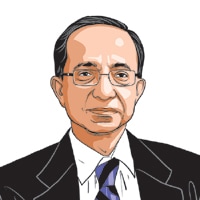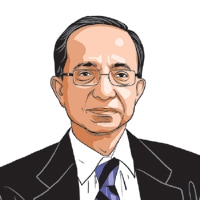Economic Graffiti: An evening in Florence
In one of the cradles of civilisation, the joys of travel are revealed in its artefacts, people and the traveller’s faux pas.

As Bertrand Russell wrote in the History of Western Philosophy, “The modern as opposed to the medieval outlook began in Italy, with the movement called Renaissance. Florence was the most civilised city in the world, and the chief source of the Renaissance.” (Picture for representational purose)
It is the sixth of October and I am changing planes in Lisbon. As we settle into our seats and fasten seat belts, a flight attendant sprays the cabin liberally with some pressurised liquid from a can. The intercom crackles and a voice with a marked Portuguese accent, which makes me for a moment wonder if I am in Goa, tells us that the spraying of this disinfectant is required under the law, and assures the passengers that it will not adversely affect our — and, alas, I cannot make out if the next word is “health” or “wealth”. I comfort myself that it is good to know at least one of these two will remain intact.
The reason for the cavalier feeling is that I am headed to one of the most beautiful cities in the world and for a wonderful purpose. I am going to Florence to get an honorary degree or, what sounds better in Latin, laurea honoris causa. To get a degree is nice; to get it without work is bliss. But the real source of joy is Florence. Florence, like Athens, is among the rare cities in the world that can lay unequivocal claim to having served as a cradle of human civilisation.
As Bertrand Russell wrote in the History of Western Philosophy, “The modern as opposed to the medieval outlook began in Italy, with the movement called Renaissance. Florence was the most civilised city in the world, and the chief source of the Renaissance.” As I spend my free time walking around the city and seeing some of the great works of art and sculpture, it is impossible not to marvel at Florence’s achievements from the 14th century all the way up to the 17th. It was the city of Machiavelli, Dante, and Botticelli. Michelangelo was born there, Galileo was born nearby, in the Duchy of Florence and Leonardo da Vinci worked there.
But talent alone is not enough to spread art and science through the world, as happened with the Italian Renaissance. Florence was lucky to have a remarkable business house at that time, the Medicis, who used their enormous financial power to nurture the arts, philosophy and science. The most notable was Lorenzo de Medici, who in the late 15th century became a patron of the scholars, artists and poets, and played a pivotal role in spreading the Renaissance to the rest of the world.
However, it is foolish to confine all of one’s attention to museums and galleries when visiting an interesting place. I find the street life and interaction with ordinary people fascinating. Italians are friendly and warm; so it is easy to start up conversations. Walking in the streets with my friend, Mario Biggeri, I meet some interesting people. There was, for instance, a small display of roadside art by a hippie-looking person. The art was stunning; I had never seen anything like that on a roadside. With Mario translating, I learned that his name was Luigi Lanotte, and he came from Puglia. When I commented on his talent, he acknowledged my praise shyly and said that his art was in several galleries and the gallery owners disapproved of his roadside display; but, he explained, he found the galleries too confining and would never abandon street art. Clearly, he was one of those true artists interested in art but could not care less about the marketing.
A walk through the Merkato Centrale with its mixture of roadside vendors, cafes and stores can be an anthropologist’s delight. I paused to buy a leather belt from a young vendor who seemed to have a flourishing business. He struggled to speak in English and I tried a few Italian words, all to no avail. Then we discovered, we had another common language — Bengali. It turned out that a large fraction of the shops and stalls there were operated by Bangladeshis. They seemed to be happy and doing well and were clearly pleased to chat with me in Bengali, though one of them pointed out that my accent sounded wrong.
Travel is wonderful, for the experience and also for the faux pas. After the ceremony of the degree conferral in an ornate auditorium of the Universita degli studi Firenze, I went with some faculty members to a café for lunch. The food in Italy and most of continental Europe is excellent. I sometimes wonder if Britain managed to out-manoeuvre other European nations in the race to colonise the world because it spent relatively so little time and energy on good food.
After the meal of a delicious lasagna, it was time to order coffee. When the waiter going around the table taking our orders came to me, I said, “One cappuccino.” He looked pale and there was a hushed silence. I wondered if, like my Bengali according to the Bangladeshi shop-owner, this time I had mispronounced cappuccino. There was an embarrassed murmur around the room. Then one of the professors leaned over to me kindly and whispered: The waiter is baffled because that is what English ladies drink and that too, only before 10 am.
My poor taste had been revealed and there was nothing I could do about it.
I began this account with the tripping up with the letter h. Let me close with a warning to future visitors to this region about this and other linguistic hazards, all of which I experienced even on this short visit. When Italians, talking about their work, say, “The head of my office is hill”, do not assume the chairman of his office is a small mountain. They mean he is under the weather. And when an Italian man, speaking about his wife, says, “He will join us soon,” do not assume he is in a same-sex relationship. He may be, but he also may not.
The writer is C. Marks Professor at Cornell University and former Chief Economist and Senior Vice President, World Bank
For all the latest Opinion News, download Indian Express App
More From Kaushik Basu
- In Good Faith: A journey, an educationTravelling in rural Bengal, Jharkhand I saw a village school at the cutting edge, and met ordinary people distressed by political cults of a hate-filled…
- Economic Graffiti: A Hinduism more tolerantAt the Ramakrishna Mission complex in Kolkata, a different face of the religion is visible from what is propagated by Hindutva..
- Economic Graffiti: The angry intellectualOne of the finest minds of our times, Ashok Mitra was anguished by poverty and inequality. His anger sometimes led him to make mistakes...








































No hay comentarios:
Publicar un comentario